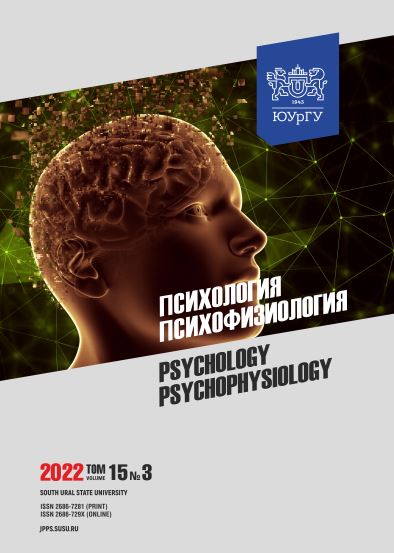Typological features of self-awareness of women who use violence against a childh
Abstract
Introduction. The mother plays a major role in the upbringing and socialization of the child. The use of violence by parents has a negative impact on the psychological health of the child, his/her cognitive function, physiological and emotional status. At the same time, the features of parent-child interaction and upbringing of the child are directly related to maternal awareness and acceptance of the maternal role, maternal self-awareness. The knowledge of the content and typological features of self-awareness of women prone to violence makes it possible to perform a targeted psychological intervention, and, therefore, to more effectively manage the use of violence against a child. Aims. The paper aims to identify the typological features of self-awareness of women who use psychological and physical violence against a child. Materials and methods. This study is based on the works of N. Vasyagina, E. Zakharova, E. Rybakova, S. Mokhova, I. Khamitova, E. Belyakova. Self-awareness was measured by using the following questionnaires and methods: self-attitude questionnaire by V. Stolin and S. Pantileev; the level of maternal subjectivity questionnaire by N. Vasyagina and K. Gulyaeva; “I am a mother” essay by N. Vasyagina; Parent-Child Interaction questionnaire by I. Markovskaya. The study involved 100 women who use physical and psychological violence against their children. The sample was formed randomly based on an anonymous survey using the ICAST-P tool. Result. The result of the study was an empirically verified typology of self-awareness of women who use violence against a child. Conclusion. As a result of the study, 5 types of women were verified. The results obtained demonstrate the features of the phenomenon under study, the variety of reasons for the use of violence and related justifications. The abovementioned is essential for a better management of maternal behavior.
Downloads
References
2. Ustinova N.A. Determinants of the development of the mother's self-awareness. Diskussiya = Discussion. 2012;6:158–162. (in Russ.).
3. Eşel E. Anneliğin Nörobiyolojisi [Neurobiology of motherhood]. Türk Psikiyatri Dergisi. 2010;21(1):68–78. (in Turkish).
4. Akande B. Some socio-cultural factors influencing fertility behaviour: a case study of Yoruba women. Biology and society. 1989;6(4):165–170.
5. van Scheppingen M.A., Denissen J.J.A., Chung J.M. et al. Self-esteem and relationship satisfaction during the transition to motherhood. Journal of Personality and Social Psychology. 2018;114(6):973–991. DOI: https://doi.org/10.1037/pspp0000156
6. Vasyagina N.N. Sub"ektnoe stanovlenie materi v sovremennom sociokul'turnom prostranstve Rossii [Subjective formation of a mother in the modern socio-cultural space of Russia]. Yekaterinburg. 2013:364. (in Russ.).
7. Beattie J., Hall H., Biro M.A. et al. Effects of mindfulness on maternal stress, depressive symptoms and awareness of present moment experience: A pilot randomised trial. Midwifery. 2017;50:174–183. DOI: https://doi.org/10.1016/j.midw.2017.04.006
8. Vasyagina N.N., Rybakova E.N. Structural and meaningful analysis of the mother's self-awareness. Obrazovanie i nauka = Education and science. 2007;2(44):75–84. (in Russ.).
9. Tarabrina N.V. Prakticheskoe rukovodstvo po psikhologii posttravmaticheskogo stressa [A practical guide to the psychology of post-traumatic stress]. Moscow. Kogito-Tsentr Publ. 2007:208. (in Russ.).
10. Volkova E.N. Problemy nasiliya nad det'mi i puti ikh preodoleniya [Problems of child abuse and ways to overcome them]. Санкт-Петербург. Piter Publ. 2008:240. (in Russ.).
11. Gartland D., Giallo R., Woolhouse H. et al. Intergenerational Impacts of Family Violence – Mothers and Children in a Large Prospective Pregnancy Cohort Study. eClinicalMedicine. 2019;15:51–61. DOI: https://doi.org/10.1016/j.eclinm.2019.08.008
References on translit
-Copyright (c) 2022 Psychology. Psychophysiology

This work is licensed under a Creative Commons Attribution-NonCommercial-NoDerivatives 4.0 International License.



